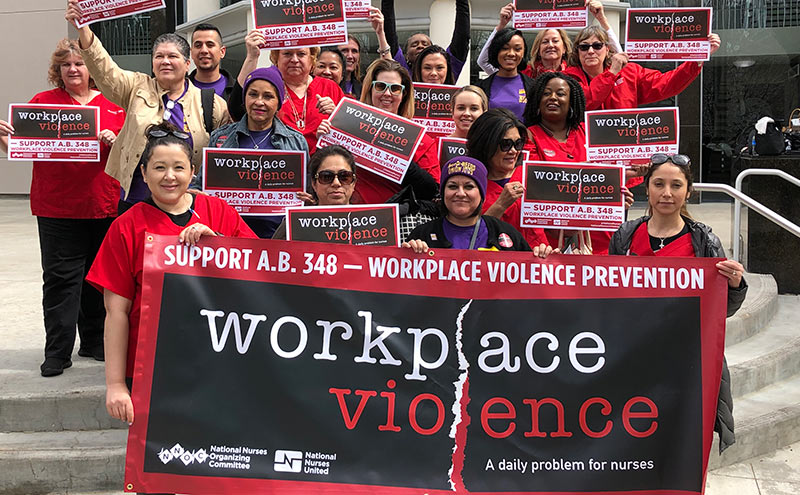Press Release
Historic Nevada Workplace Violence Prevention Bill Passes Major Hurdle

Health care workers with National Nurses Organizing Committee-Nevada/National Nurses United (NNOC/NNU) and Service Employees International Union (SEIU) Local 1107 are excited to announce the state’s first workplace violence prevention bill, A.B. 348, passed a major hurdle as the Nevada Assembly overwhelmingly approved the measure last night. The bill now goes to the Senate.
“I am ecstatic at what we have achieved with this important milestone. This vote means that lawmakers have heard our voices, and are taking seriously the threats that we face at work,” said Christy Crown, a registered nurse in Las Vegas and member of NNOC/NNU. “My colleagues have worked hard to educate the public and our representatives about the dangers health care workers face daily. We now call on the state Senate to hold employers accountable for protecting health care workers on the job, and providing a safe environment for patients, their families, and their visitors.”
A.B. 348, introduced by Nevada Assemblymember Michelle Gorelow, would require health care employers to create comprehensive workplace violence prevention plans and track violent incidents in hospitals and other medical facilities.
“When our nurses and health care workers are at risk, then we are all at risk,” said Gorelow. “I am proud to author A.B. 348 and that the Assembly took this opportunity to take care of those who take care of us.”
“This is indeed a wonderful victory, and an important step forward in the fight for workplace violence prevention plans that will help protect nurses, health care workers and patients,” said Jody Domineck, a registered nurse and executive board member of SEIU Local 1107. “We are very encouraged by the leadership shown by the Nevada Legislature today and are determined to fight until A.B. 348 becomes the law.”
The risk of workplace violence is a serious occupational hazard for RNs and other health care workers—who experience violence on every shift and routinely report being kicked, punched, slapped, pushed, spat on, and verbally threatened.
Statistics from the U.S. Government Accountability Office (GAO) indicate the problem of violence in medical settings is on the rise. A 2016 GAO report found a greater than 12 percent increase in workplace violence-related injuries for health care workers between 2011 and 2013. Violence against nurses and other health care workers causes trauma, injuries, and even death. According to the U.S. Bureau of Labor Statistics Census of Fatal Occupational Injuries, between 2011 and 2016 at least 58 hospital workers died as a result of violence in their workplaces.
Studies have shown that the frequency and severity of violent attacks can be drastically reduced through comprehensive workplace violence prevention plans.
A.B. 348 is sponsored by Nevada health care unions NNOC/NNU and SEIU Local 1107. The bill has also been endorsed by the Nevada state AFL-CIO.
Highlights of the Workplace Violence Prevention Bill -- A.B. 348
- It creates a Nevada OSHA standard to require health care employers to create comprehensive workplace violence prevention plans.
- The definition of workplace violence must include any act of violence or threats of violence, regardless of whether an employee was injured.
- The plans must be unit specific and created in collaboration between employers and employees.
- The plans must delineate how employers will implement appropriate and effective prevention measures such as staffing, security response, alarms, sufficient lighting, and other measures.
- The plans must include procedures for employees to report all incidents of workplace violence without fear of reprisal.
- Employers must provide effective training programs, including hands on de-escalation training for all employees with patient contact.
- The bill requires that health care employers keep records of all workplace violence incidents and report certain incidents to the Department of Industrial Relations.